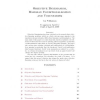Free Online Productivity Tools
i2Speak
i2Symbol
i2OCR
iTex2Img
iWeb2Print
iWeb2Shot
i2Type
iPdf2Split
iPdf2Merge
i2Bopomofo
i2Arabic
i2Style
i2Image
i2PDF
iLatex2Rtf
Sci2ools
SYNTHESE
2011
2011
Objective Bayesianism, Bayesian conditionalisation and voluntarism
Objective Bayesianism has been criticised on the grounds that objective Bayesian updating, which on a finite outcome space appeals to the maximum entropy principle, differs from Bayesian conditionalisation. The main task of this paper is to show that this objection backfires: the difference between the two forms of updating reflects negatively on Bayesian conditionalisation rather than on objective Bayesian updating. The paper also reviews some existing criticisms and justifications of conditionalisation, arguing in particular that the diachronic Dutch book justification fails because diachronic Dutch book arguments are subject to a reductio: in certain circumstances one can Dutch book an agent however she changes her degrees of belief. One may also criticise objective Bayesianism on the grounds that its norms are not compulsory but voluntary, the result of a stance. It is argued that this second objection also misses the mark, since objective Bayesian norms are tied up in the v...
| Added | 15 May 2011 |
| Updated | 15 May 2011 |
| Type | Journal |
| Year | 2011 |
| Where | SYNTHESE |
| Authors | Jon Williamson |
Comments (0)

